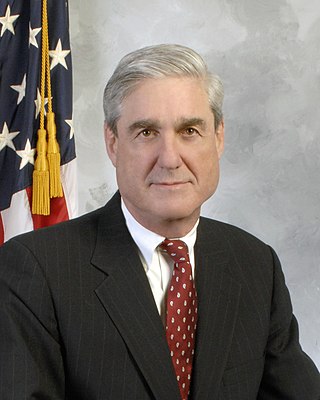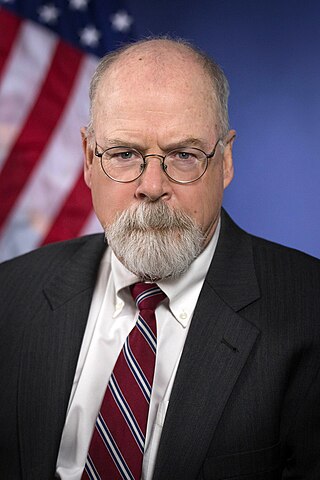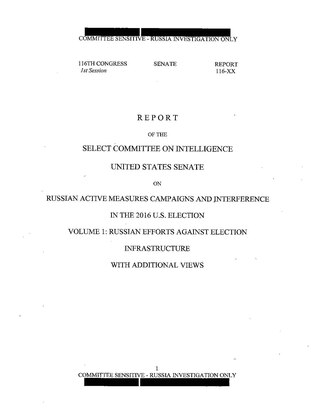Related Research Articles

Robert Swan Mueller III is an American lawyer who served as the sixth director of the Federal Bureau of Investigation (FBI) from 2001 to 2013.
The Office of Special Counsel was an office of the United States Department of Justice established by provisions in the Ethics in Government Act that expired in 1999. The provisions were replaced by Department of Justice regulation 28 CFR Part 600, which created the successor office of special counsel. The current regulations were drafted by former acting solicitor general Neal Katyal.

William Pelham Barr is an American attorney who served as United States attorney general in the administration of President George H. W. Bush from 1991 to 1993 and again in the administration of President Donald Trump from 2019 to 2020.

John Henry Durham is an American lawyer who served as the United States Attorney for the District of Connecticut from 2018 to 2021. By April 2019, the Trump administration assigned him to investigate the origins of the Federal Bureau of Investigation (FBI) investigation into Russian interference in the 2016 U.S. elections, and in October 2020 he was appointed special counsel for the Department of Justice on that matter.

Paul John Manafort Jr. is an American former lobbyist, political consultant, and attorney. A long-time Republican Party campaign consultant, he chaired the Trump presidential campaign from June to August 2016. Manafort served as an adviser to the U.S. presidential campaigns of Republicans Gerald Ford, Ronald Reagan, George H. W. Bush, and Bob Dole. In 1980, he co-founded the Washington, D.C.–based lobbying firm Black, Manafort & Stone, along with principals Charles R. Black Jr. and Roger Stone, joined by Peter G. Kelly in 1984. Manafort often lobbied on behalf of foreign leaders such as former President of Ukraine Viktor Yanukovych, former dictator of the Philippines Ferdinand Marcos, former dictator of Zaire Mobutu Sese Seko, and Angolan guerrilla leader Jonas Savimbi. Lobbying to serve the interests of foreign governments requires registration with the Justice Department under the Foreign Agents Registration Act (FARA); on June 27, 2017, he retroactively registered as a foreign agent.

The Russian government conducted foreign electoral interference in the 2016 United States elections with the goals of sabotaging the presidential campaign of Hillary Clinton, boosting the presidential campaign of Donald Trump, and increasing political and social discord in the United States. According to the U.S. intelligence community, the operation—code named Project Lakhta—was ordered directly by Russian president Vladimir Putin. The "hacking and disinformation campaign" to damage Clinton and help Trump became the "core of the scandal known as Russiagate". The 448-page Mueller Report, made public in April 2019, examined over 200 contacts between the Trump campaign and Russian officials but concluded that there was insufficient evidence to bring any conspiracy or coordination charges against Trump or his associates.
Since Donald Trump was a 2016 candidate for the office of President of the United States, multiple suspicious links between Trump associates and Russian officials were discovered by the FBI, a special counsel investigation, and several United States congressional committees, as part of their investigations into Russian interference in the 2016 United States elections. Following intelligence reports about the Russian interference, Trump and some of his campaign members, business partners, administration nominees, and family members were subjected to intense scrutiny to determine whether they had improper dealings during their contacts with Russian officials. Several people connected to the Trump campaign made false statements about those links and obstructed investigations. These investigations resulted in many criminal charges and indictments.

The Robert Mueller special counsel investigation was an investigation into 45th U.S. president Donald Trump regarding Russian interference in the 2016 United States elections and was conducted by special prosecutor Robert Mueller from May 2017 to March 2019. It was also called the Russia investigation, Mueller probe, and Mueller investigation. The investigation focused on three points:
- Russian interference in the 2016 United States elections
- Trump associates and their connection to Russian officials and espionage
- Possible obstruction of justice by Trump and his associates

Richard William Gates III is an American former political consultant and lobbyist who pleaded guilty to conspiracy against the United States for making false statements in the investigation into Russian interference in the 2016 United States elections. He is a longtime business associate of Paul Manafort and served as deputy to Manafort when the latter was campaign manager of the Donald Trump presidential campaign in 2016, and after under Kellyanne Conway.
This is a timeline of major events in first half of 2018 related to the investigations into links between associates of Donald Trump and Russian officials and spies that are suspected of being inappropriate, relating to Russian interference in the 2016 United States elections. It follows the timeline of Russian interference in the 2016 United States elections before and after July 2016 up until election day November 8, the transition, and the first and second halves of 2017, but precedes the second half of 2018, the first and second halves of 2019, 2020, and 2021. These events are related to, but distinct from, Russian interference in the 2018 United States elections.

The two criminal trials of Paul Manafort were the first cases brought to trial by the special counsel's investigation into Russian interference in the 2016 presidential election. Manafort served as campaign chair for the Donald Trump 2016 presidential campaign from June 20 to August 19, 2016. In July 2017, the FBI conducted a raid of Manafort's home, authorized by search warrant under charges of interference in the 2016 election. Manafort and his business assistant Rick Gates were both indicted and arrested in October 2017 for charges of conspiracy against the United States, making false statements, money laundering, and failing to register as foreign agents for Ukraine. Gates entered a plea bargain in February 2018.
The 2017–2019 Special Counsel investigation involved multiple legal teams, specifically the attorneys, supervised by Special Counsel Robert Mueller, taking part in the investigation; the team representing President Trump in his personal capacity; and the team representing the White House as an institution separate from the President.
Reactions to the Special Counsel investigation of any Russian government efforts to interfere in the 2016 presidential election have been widely varied and have evolved over time. An initial period of bipartisan support and praise for the selection of former FBI director Robert Mueller to lead the Special Counsel investigation gave way to some degree of partisan division over the scope of the investigation, the composition of the investigative teams, and its findings and conclusions.
This is a timeline of events in the first half of 2019 related to investigations into the many suspicious links between Trump associates and Russian officials and spies relating to the Russian interference in the 2016 United States elections. It follows the timeline of Russian interference in the 2016 United States elections, both before and after July 2016, until November 8, 2016, the transition, the first and second halves of 2017, the first and second halves of 2018, and followed by the second half of 2019, 2020, and 2021.
The Special Counsel investigation was a United States law enforcement and counterintelligence investigation of the Russian government's efforts to interfere in United States politics and any possible involvement by members of the 2016 Trump presidential campaign. It was primarily focused on the 2016 presidential election.

The Barr letter is a four-page letter sent on March 24, 2019, from Attorney General William Barr to leaders of the House and Senate Judiciary Committees purportedly detailing the "principal conclusions" of the Mueller report of the Special Counsel investigation led by Robert Mueller into Russian efforts to interfere in the 2016 United States presidential election, allegations of conspiracy or coordination between Donald Trump's presidential campaign and Russia, and allegations of obstruction of justice.
Crossfire Hurricane was the code name for the counterintelligence investigation undertaken by the Federal Bureau of Investigation (FBI) from July 31, 2016, to May 17, 2017, into links between Donald Trump's presidential campaign and Russia and "whether individuals associated with [Trump's] presidential campaign were coordinating, wittingly or unwittingly, with the Russian government's efforts to interfere in the 2016 U.S. presidential election". Trump was not personally under investigation until May 2017, when his firing of FBI director James Comey raised suspicions of obstruction of justice, which triggered the Mueller investigation.

The Mueller report, officially titled Report On The Investigation Into Russian Interference In The 2016 Presidential Election, is the official report documenting the findings and conclusions of former Special Counsel Robert Mueller's investigation into Russian efforts to interfere in the 2016 United States presidential election, allegations of conspiracy or coordination between Donald Trump's presidential campaign and Russia, and allegations of obstruction of justice. The report was submitted to Attorney General William Barr on March 22, 2019, and a redacted version of the 448-page report was publicly released by the Department of Justice (DOJ) on April 18, 2019. It is divided into two volumes. The redactions from the report and its supporting material were placed under a temporary "protective assertion" of executive privilege by then-President Trump on May 8, 2019, preventing the material from being passed to Congress, despite earlier reassurance by Barr that Trump would not exert privilege.
The Russia investigation origins counter-narrative, or Russia counter-narrative, is a narrative embraced by Donald Trump, Republican Party leaders, and right-wing conservatives attacking the legitimacy and conclusions of investigations into Russian interference in the 2016 elections, and the links between Russian intelligence and Trump associates. The counter-narrative includes conspiracy theories such as Spygate, accusations of a secretive, elite "deep state" network, and other false and debunked claims. Trump in particular has attacked not only the origins but the conclusions of the investigation, and ordered a review of the Mueller report, which was conducted by attorney general William Barr – alleging there was a "deep state plot" to undermine him. He has claimed the investigations were an "illegal hoax", and that the "real collusion" was between Hillary Clinton, Democrats, and Russia – and later, Ukraine.

The Senate Intelligence Committee report on Russian interference in the United States presidential election, officially titled Report of the Select Committee on Intelligence United States Senate on Russian Active Measures Campaigns and Interference in the 2016 U.S. Election, is the official report in five volumes documenting the findings and conclusions of the United States Senate Intelligence Committee concerning the Russian attack efforts against election infrastructure, Russia's use of social media to affect the election, the U.S. government's response to Russian activities, review of the Intelligence Community Assessment, and counterintelligence threats and vulnerabilities. The redacted report is 1,313 pages long. It is divided into five volumes.
References
- ↑ "Robert Mueller appears to be using an obscure tool in his Russia investigation". Newsweek . 2018-08-24. Retrieved 2018-11-23.
- ↑ Feuer, Alan; Haberman, Maggie (2023-06-09). "Indictment Presents Evidence Trump's Actions Were More Blatant Than Known". The New York Times . ISSN 0362-4331 . Retrieved 2023-06-10.
- ↑ Swanson, Ian (2018-08-24). "Mueller's 'speaking indictments' offer clues to strategy". The Hill . Retrieved 2018-11-23.
- ↑ "Russia indictments lay the foundation for broader conspiracy charges, says former FBI special counsel". PBS NewsHour . Feb 19, 2018. Retrieved 2018-11-23.